I am sure that almost all cat owners have experienced their cat begging for human food, especially during mealtime. How many times have you caught your cat stealing food from your table or kitchen counter and thought to yourself ”how can you still be hungry? You just ate!”. I am asking my cats the same questions every day!
I will be honest with you. I gave up many times and fed my cats table scraps. But after a while, I started realizing that this must not be good for their health. So, I did research with 560 cat owners to find out how many people do the same. Also, I wanted to write this article to help cat owners understand which human foods we should avoid feeding our cats and why.


Why Is Human Food Bad For Cats?
Although human food may be tasty and healthy for people, it could be harmful and toxic for cats. The reason is that some human foods contain substances that may cause severe problems with cats’ nervous and digestive systems. For example, cats must not consume food that contains artificial chemical preservatives, corn, wheat gluten, artificial food dyes, etc.
However, this is not the case with all human foods. While some food may be fatal, other is simply not recommended for cats because it is not nutritionally complete and balanced. In particular, it does not contain enough proteins, carbohydrates, fats, vitamins, minerals, fiber, and other micronutrients. So, if you want to make sure you are feeding your cat properly, you should first know which foods to avoid.
Toxic Foods Cats Must Not Ever Eat
First and foremost, you should never feed your cat any member of the onion family. This includes onion, garlic, leeks, chives, and shallot. Although a small amount of these vegetables found in sauce shouldn’t harm your cat, if eaten regularly, the onion family could cause both digestive upset and anemia. It positively surprised me that only 0.9% of the respondents fed their cat onion or garlic. But I am pretty sure that in most cases cats served themselves.
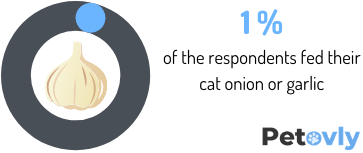

When it comes to other foods that may risk your cat’s health as well, did you know that fat trimmings, bad raw meat and fish, along with raw eggs can cause not only vomiting and diarrhea but also lead to feline pancreatitis? As a matter of fact, too much fat in your cat’s diet can soon lead to an inflammation of the pancreas. It is important to mention the high risk of E. coli and Salmonella as well.
However, do not confuse this with a raw diet. If you want to feed your cat raw diet, get familiar with it and put your cat’s health first. Anyway, 15.4% of the respondents say they fed their cat raw eggs and 42.7% said they fed their felines bad raw meat and fish.


Apart from the bad raw meat and some vegetables we listed, it is relevant to mention the guilty pleasures that most people enjoy: chocolate, coffee, and alcohol. I think it is more than obvious that the substances these foods contain shouldn’t be given to any of our pets. At the very least, if consumed by cats, alcohol will cause vomiting, diarrhea, and a temporary lack of coordination.
However, in serious cases, cats may experience depression, coma, seizures, or even death. The same may happen if cats eat too much sweet food or caffeine which is not present only in coffee but in chocolate as well. Chocolate contains methylxanthines which are substances that are found in cacao seeds. The darker the chocolate, the higher the levels of methylxanthines.
What surprised me in a negative way is that one of the respondents of my survey answered that he or she gave alcohol to his or her cat and 1.1% answered they gave coffee to their pets. Furthermore, 16.6% of cat owners mention their cats have tried sweet food which included chocolate, pudding, ice cream, and other food.


Lastly, the foods that you should always avoid giving to your cats are raw yeast dough, citrus fruits, and Xylitol. First of all, the raw yeast dough will cause the cat’s stomach to expand and create alcohol. But don’t worry if you have fed your cat bread. Although it is not recommended for cats to eat it, a small amount of bread won’t hurt your lovely friend. In fact, 13.4% of cat owners said their cats have tried bread and there were no considerable consequences.
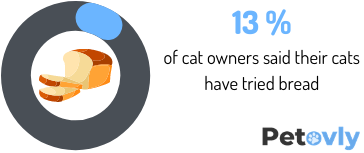

When it comes to citrus fruits such as lemons, limes, clementines, oranges, etc., such fruits are considered toxic for cats because they contain essential oils extracts which make cats sick. Lastly, Xylitol, which is a natural sweetener useful only for people who want to cut calories, is toxic to animals. If a cat consumes Xylitol, it will result in hypoglycemia and your cat can end up with liver failure.
Dairy Products, Salty & Fatty Foods Cause Harm
I am sure that many of you, just like me and 8.6% of the respondents, have given your cat salty or fatty scraps of food. In my case, this included leftovers from time to time. But why should we avoid giving our cats fried chicken, beef, pork, french fries, tortilla chips, and other types of similar food? Not only because this is generally food that is not recommended for people to eat every day. It has little or no nutritional value at all, especially for cats.


What is more, this food also has too much salt or fat and this can cause disfunction in cats’ cells. I have already mentioned how too much fat can lead to severe health problems in a cat’s digestive system which leads us to oil. No oil, whether sunflower, olive, coconut, avocado, peanut, or any other should ever be given to cats.
Also, believe it or not, dairy products shouldn’t be on your cat’s everyday menu either. Especially if we are talking about products with a high percentage of milk fat. Besides that, a large number of cats are lactose-intolerant. The higher the milk fat percentage in dairy, the more lactose it contains. I assume that your cats have tried milk more than once.
In fact, 190 out of 560 cat owners from my survey provide their cats with a bowl of milk on a regular basis. But don’t be afraid if you give your cat a little bit of milk from time to time. Just make sure it is low-fat and water it down. Otherwise, your cat may end up with diarrhea, loss of appetite, or vomiting.


Apart from being toxic to dogs, grapes and raisins are bad for cats as well. It is not yet known why exactly grapes and raisins are so dangerous to pets. But one thing is for sure – sometimes they can cause severe problems. Although this is not the case with every pet, it is best to avoid feeding your cats these fruits as a precaution. As a matter of fact, some pets may develop acute kidney failure, while others will end up with vomiting only.
Equally, some mushrooms may be unhealthy or potentially dangerous to cats. Of course, you are not going to give your cats wild mushrooms, but a big amount of the store-bought ones may result in weakness, loss of appetite, diarrhea, or vomiting. Luckily, only 1.1% of the respondents said their cats ate mushrooms.


The same goes for avocados. Although a small amount of this fruit shouldn’t leave any consequences, if eaten in large quantity and on a regular basis, avocados can cause gastrointestinal distress, pancreatitis, obstruction of stool, etc. The reason is that avocados contain a toxic called Persin which is not dangerous to humans, but cats and other domestic animals shouldn’t consume it. Luckily, only 4 out of 560 respondents said their cats have tried avocado.


Avoid Feeding Your Cats Cooked Bones And Dog Food
Have you ever tried feeding your cat bones? Cats are carnivores and it seems logical that raw food and bones are good for them. And indeed, opposite to cooked bones and bad raw meat and fish, raw bones are healthy for your cat. They are rich in nutrients and simpler for cats to digest. But why are cooked bones bad for your cat? It happens that cooked bones are brittle and this makes them dangerous to eat.
The following fact surprised me a lot – tuna can cause health issues for cats. It seems that cats are attracted to tuna’s strong smell. But what makes it bad for cats is the fact that this fish does not include all the nutrients that your feline needs. Also, it contains a high percentage of unsaturated fat which means that your cat can easily gain weight. Moreover, some cats are allergic to fish and you may not be aware of that.
Also, tuna is high in mercury which may be toxic if ingested in high amounts and could cause dizziness. All in all, a small amount of tuna from time to time will not hurt your cat. In fact, a large number of our respondents (44.1%) feed their cat tuna from time to time. However, tuna shouldn’t be your cat’s primary source of nutrition.


In the end, you should also know that it is not big harm, but still not recommended for cats to eat dog food, potatoes, and nuts. When it comes to nuts, I am sure that you can already assume that they have a high percentage of fats and this is the main reason why they are not healthy. This is especially true for macadamia nuts, almonds, and walnuts. Lastly, dog food and potatoes have no nutritional value for cats. Some cats may feel sick after eating these foods as well. Although around 14% of our respondents fed their cats both potatoes and dog food, I suggest you keep them out of your cat’s reach, just in case.
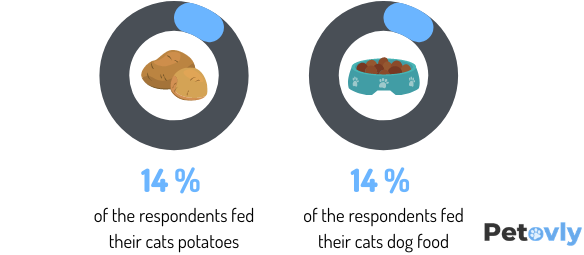

Cat Food Poisoning Symptoms
I have asked the respondents of my survey about the quality of cat food they are feeding their cats. As expected, the majority of cat owners (54.2%) answered how they feed their cats medium quality canned and dry cat food. Only 2.4% said they give their cats food of bad quality, and the rest will most often feed their cats high-quality canned and dry cat food. From this, I came to the conclusion that cats’ health is very important to most cat owners. Although a high number (73%) of participants never had any experience with cat food poisoning, the rest of them had experience with both light and severe symptoms.


Light Symptoms That Show Your Cat Ate Bad Food
Many cat owners have had experience with their cat vomiting (18.9%) and having diarrhea (13%). It is not uncommon for your cat to have an upset tummy from time to time. It is true that these two symptoms can both be light and severe. If apart from that, your cat acts normal, you shouldn’t worry too much. Just check on your cat from time to time just to be sure it feels better.
Another suggestion is to feed your cat cooked rice and boiled chicken for a couple of days and it should all go well. However, don’t hesitate to contact your veterinarian in case you notice any other symptom accompanied by vomiting or loose stool.
These Symptoms Indicate Cat’s Health Is In Danger
In case your cat experiences some of the following symptoms, you should contact your vet immediately: loss of energy, inability to walk or stand, vomiting and diarrhea for more than 12 hours, blood in stool or vomit, parasites in vomit or stool, difficulty breathing, excessive thirst, seizures, drooling, inflammation or swelling of the skin, coma, depression, excessive urinating, abdominal pain, and coughing.
Going back to our survey, this is the data: little less than one percent of cat owners had experience with their cat’s breathing difficulties, then, 5.4% are familiar with symptoms of loss of appetite. About 2% noticed excessive drooling, and luckily, only 1.4% know what it is like when a cat ends up in a coma or has a seizure.
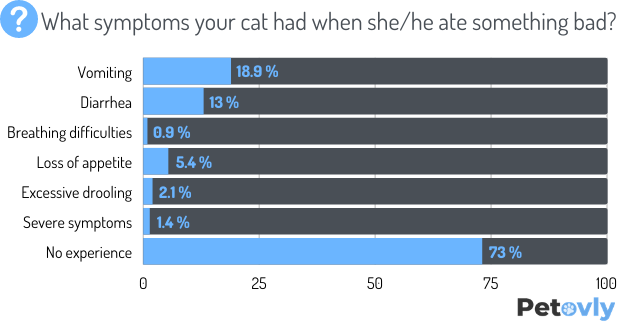

What Do Vets Say?
Apart from asking cat owners about their cat-feeding experience, we have talked to Dr. Karie Johnson who is a co-founder of VIP Vet Visit. Dr. Karie and her colleagues provide mobile veterinary services in Chicago’s southwest suburbs. Their goal is to help pets and their owners to wait less for a vet’s exam and feel calmer in the comfort of their home.
How often do you visit cats poisoned by eating bad food?
I would say since we are a mobile 1 veterinarian practice, I see a cat once a month that has eaten something they shouldn’t. When I worked in a brick and mortar practice I would increase that to once weekly since we had 4 doctors.
Because of which bad foods do cat owners ask for your services most often?
Which symptoms, in your experience, have been most frequent in a cat poisoned by bad food?
What To Do If Your Cat Ate Bad Food
Monitor Your Cat
If you notice that your cat ate table scraps, leftover food, or foods that are not too harmful if eaten in a small amount, you should monitor your cat for a couple of hours and see if it will experience some of the symptoms. You may not know that your cat is allergic or intolerant to certain foods. If your cat acts normal and has one of the light symptoms for only a couple of hours, it should all be fine. However, if you notice that your cat’s state has worsened, contact your veterinarian or take your cat to the clinic immediately.
Feed Your Cat Light Food
Again, if your cat has signs of upset tummy which last only a couple of hours, and apart from that, he or she is active and looks like is not in pain, it is only recommended to feed him or her light food for a few of days. Other than cooked rice and boiled chicken, you will find quality gastrointestinal dry and canned cat food in pet shops. Such food is low in calories but high in protein, vitamins, and natural fibers. Before you do that, I suggest you consult a veterinarian or another expert.
Visit Your Veterinarian
In case your cat has experienced some of the severe symptoms, make sure to visit your veterinarian as soon as possible. Your veterinarian will provide your cat with adequate treatment until all the symptoms resolve. In some rare cases, the treatment includes hospitalization and intravenous fluids. In most cases, your furry friend will go back home the same day. Remember, most cats end up just fine if you react in time.
Conclusion
The altogether results of the survey led to the conclusion that most cat owners are aware that some human food may be toxic to cats. About 43% of the participants own between 2 and 4 cats and they have been cat owners for more than 3 years. It makes me happy that most owners feed their cats medium to high-quality cat food.


Thankfully, only 3.4% of them visited a veterinarian due to cat food poisoning. It should be noted that more than 76% owns cats with no health problems. However, some of the most common health issues that the rest of the cat owners have experience with are gastritis (3.4%) and gastrointestinal problems, food allergies (2.7%), food intolerance (3.9%), and frequent diarrhea (5.4%). Other much less common issues our respondents’ cats suffer from are leukemia, FIV, FeLV, urinary problems, asthma, pancreatitis, gingivitis, and epilepsy.


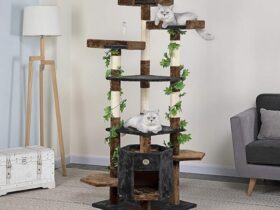

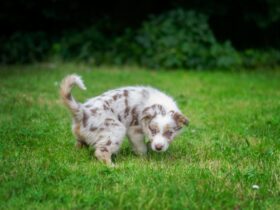
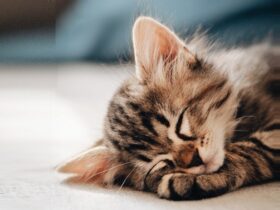






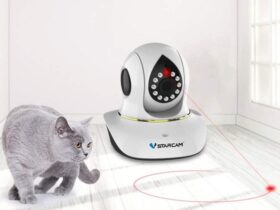





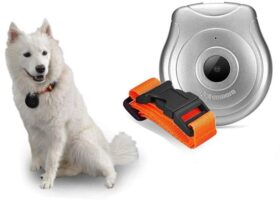
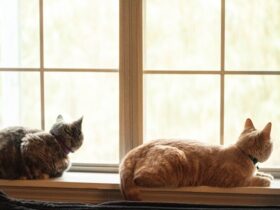


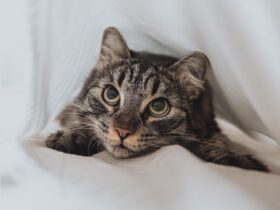
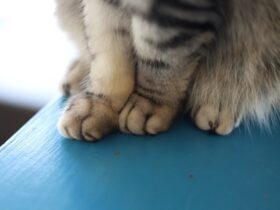

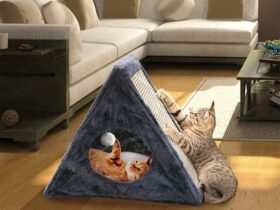

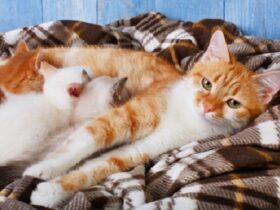
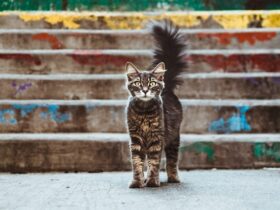
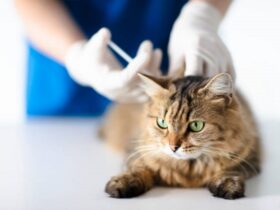
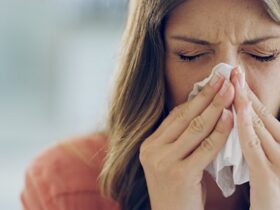
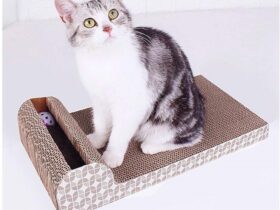
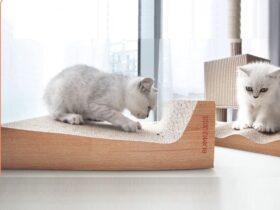
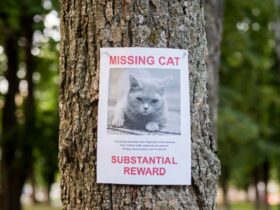
Leave a Reply